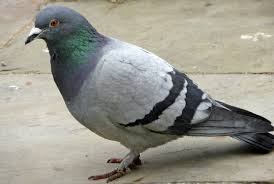中文词源
pigeon 鸽子
来自古法语pigeon,小鸽子,来自拉丁语pipio,雏鸽,叽叽喳喳叫的小鸟,来自pipire,叽叽喳喳叫,拟声词。
英语词源
- pigeon
-
pigeon: [14] Pigeon comes ultimately from late Latin pīpiō. This meant originally simply ‘young bird’, and was formed from the onomatopoeic base *pīp- (source also of English pipe), which imitated the chirps of young birds. It gradually specialized in use to ‘young pigeon, squab’, and both the general and the specific senses passed via Vulgar Latin *pībiō into Old French as pijon. By the time it arrived in English, however, only the ‘young pigeon’ sense survived, and this was soon overtaken by ‘pigeon’ in general.
=> pipe - pigeon (n.)
- late 14c. (early 13c. as a surname), from Old French pigeon "young dove" (13c.), probably from Vulgar Latin *pibionem, dissimilation from Late Latin pipionem (nominative pipio) "squab, young chirping bird" (3c.), from pipire "to peep, chirp," of imitative origin. Meaning "one easily duped" is from 1590s. Replaced culver (Old English culufre, from Vulgar Latin *columbra, from Latin columbula) and native dove.
权威例句
- 1. A pigeon emerges, wings flapping noisily, from the tower.
- 一只鸽子从塔里钻出来,扑扑地拍打着翅膀。
- 2. I don't care where the money comes from — that's not my pigeon.
- 我不管钱从哪儿来,那不是我的事.
- 3. The pigeon homed from a distance of 100 miles.
- 鸽子从百英里之外返回窝巢.
- 4. A pigeon strutted along the roof, cooing rhythmically.
- 一只鸽子沿着屋顶大摇大摆地走, 有节奏地咕咕叫.
- 5. Because I had an unusual accent people were not able to put me into a pigeon-hole.
- 因为我与众不同的口音,人们无法把我归入任何一类。

